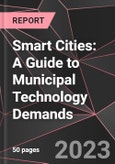For Innovation to Align With Infrastructure, Smart City Technology Providers Should Explicitly Address Non-Functional Requirements.
The “Smart Cities: A Guide to Municipal Technology Demands” report is approximately 12,000 words (50 pages). It exists to help tech companies analyze the procurement needs and non-functional requirements of municipal stakeholders. City governments themselves may also derive value by studying others.
With precise municipal observations gleaned from technology reviews, RFPs, and academic papers, Smart City vendors can position their products and services as the ideal solution, position their brands as trusted advisors and collaborative partners, and develop tailor-made offerings. For these reasons, this report is also useful for navigating public-private partnerships generally.
Smart City technology providers strive to deliver innovative solutions that transform the urban landscape. But how can they ensure they check off the right boxes for the procurement managers wading through bids, and the government IT leaders overseeing complex tech stacks? How can technology providers illuminate the value of data in terms of more efficient, sustainable municipal services? And how can city governments rally together support internally?
This report pools together the perspectives of municipal stakeholders, delivering a crucial understanding of Smart City technology adoption. It’s a must-read for technology providers aiming to align their products with city needs, for tech companies’ investors, and for city leaders or policymakers seeking to review internal processes, benchmark progress, and plan effectively. This report will also detail practical approaches to help technology providers maximize their market share in futuristic cityscapes.
Smart Cities: A Guide to Municipal Technology Demands Report Highlights:
- Smart City technologies are tools that augment municipal intelligence and optimize operations, but they still require human operators and approvals. Therefore, technologists’ success hinges on a complete understanding of these stakeholders’ needs and perspectives.
- Even with the novelty and specificity of the “Smart Cities” concept wearing thin, it’s still a recurring term and a valid conversation starter. It calls for a synergistic approach to municipal partnerships, followed by ongoing digital support structures.
- Smart City implementations must balance the technical need for modernization with budgetary constraints, necessitating a multi dimensional approach. Modular and scalable Smart City solutions allow cities to invest within their means and scale up as needed, emphasizing the importance of quickly deriving actionable insights for efficient resource allocation and service improvement.
- As cities grow, there’s an increasing emphasis on transparent, data-driven decision-making, evidenced by initiatives like NYC Open Data, DataSF, and Dublinked.
- An efficient, interconnected, and dynamic data ecosystem works to support resilience and adaptability in city infrastructure.
- A unified focus on data security, privacy, and regulatory compliance shows an understanding and respect for the seriousness of these endeavors, further cements new alliances, and works to thwart bad actors and negative outcomes.
- A commitment to training and support ensures that unique value propositions lead to full value delivery.
- The confluence of these pivotal tenets transcends the traditional vendor-client relationship, leading instead to a digital partnership characterized by innovation, trust, and service of communities.
This report will provide answers to the following questions:
- What are the non-functional requirements of Smart City technology adopters?
- What are their key considerations around usability, interoperability, and scalability?
- What factors complicate cities’ perceptions of cost-effectiveness?
- How do cities think about data security, privacy, and regulatory compliance?
- How are reliability and future-proofing sometimes at odds?
- Why is training and support a foundational, yet often overlooked, requirement?
Table of Contents
1. Introduction to Municipal Technology Demands
1.1 Key Benefits of This Report
1.2 Target Audience
1.3 Companies Mentioned in This Report
1.4 Methodology
1.5 Executive Summary
2. Municipal Technology Demands
2.1 Data-Driven Efficiencies
2.2 Cost-Effectiveness
2.3 Interoperability
2.4 Usability and Scalability
2.5 Data Security, Privacy, and Regulatory Compliance
2.6 Reliability and Future-Proofing
2.7 Training and Support
2.8 Key Takeaways
Companies Mentioned (Partial List)
A selection of companies mentioned in this report includes, but is not limited to:
- Cisco
- Granicus
- Palo Alto Networks
- Schneider Electric








